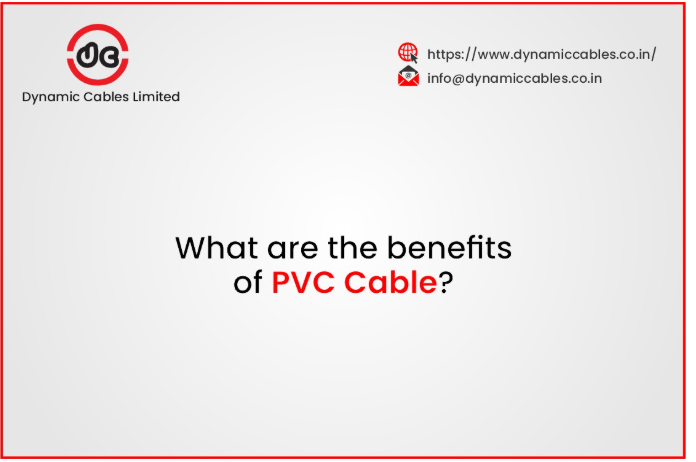- An ISO 9001:2015, 14001:2015 & 45001:2018 Company

What are the benefits of PVC cable?
Power is the primary source of energy for the majority of the world's objects.
PVC cable is a well-known and reliable solution for transferring power from homes to factories effectively and securely. For those working on a home project or a commercial manufacturing facility, PVC cables are known to be affordable, durable, and easy to use.
Let's examine why PVC cables and their various types are ideal for many electrical tasks.
PVC Cable - What Makes It Popular?
PVC cables use polyvinyl chloride (PVC) as covering and insulation. It is widely used due to its elasticity and security features and also its sturdy resistance to heat and chemicals.
Here's the reason PVC cable is an increasingly popular choice:
- Installation is simple and easy to do
- Resistant to flames and heat
- Cost-effective
- Flexible to suit different needs
- Durable even under mechanical stress
PVC Wire - The Go-To Option for Everyday Use
PVC wire is a kind of electrical wire encased in PVC insulation. It is commonly utilized in buildings, homes as well as light industrial applications. The reason people prefer PVC wire is that it's secure, safe to work with, and doesn't require any special tools to install.
PVC Insulated Cable - Safe and Reliable
PVC Insulated cable includes a layer of insulation constructed of PVC that shields the cable from water, heat, and other chemicals. It is perfect for standard temperatures and load applications.
The benefits of PVC Insulated cable:
- Guards against short circuits
- Manages wear and tear from everyday use
- Cheap and readily available
- Does well in normal temperatures
PVC Flexible Cable - Perfect for Tight Spaces
Flexible cable made of PVC is made to stretch and bend easily and is ideal for applications in which the cable must move around or fit into a small space.
The benefits of PVC Flexible cable
- Installation is simple in conduits and corners.
- Reduces the possibility of cable damage
- In-home appliances, as well as office setups
PVC Pipe Cable - Great for Organised Wiring
PVC pipe cable refers to wires run by PVC pipelines and conduits. They are used primarily to shield wires from harm and to keep them organized inside the structure.
The advantages of PVC Pipe Cable:
- Keeps the wiring tidy
- Guards against dust, water, and rodents
- It is safe to use in ceilings and walls
PVC Armoured Cable - Strong and Durable
A PVC armored cable is a high-performance cable that has a metal layer for protection from mechanical damage and a PVC cover. It is used in industrial areas, underground installations, as well as outdoor installations.
Uses of PVC armoured cable
- Strong and resistant to impact
- Great for electrical systems that require high load.
- Perfect for heavy-duty and underground use
How Does PVC Cable Compare to XLPE Cable?
To assist you in choosing the correct cable, here's a quick comparison of PVC cables and XLPE cable
| Feature | XLPE Cable | PVC Cable |
|---|---|---|
| Load Capacity | High | Standard |
| Heat Resistance | As high as 90degC (250degC for short circuit) | up to 70°C/85oC (160degC for short circuit) |
| Installation | A little bit harder | Very simple |
| Durability | Needs care | Very robust |
| Chemical Resistance | Excellent | Good |
| Health Safety | Non-toxic | It releases harmful fumes when it is burned |
| Diameter | Slimmer | A little thicker |
| Oil Resistance | High | Medium |
Where is Low Voltage PVC Cable Used?
PVC cables with low voltage are typically used to power machines and motors in industrial settings, for house wiring applications. These cables are made to work in systems that require voltage ratings ranging from 1kV to 3.3kV and followIS, IEC and BS standards.
Applications:
- Industrial equipment
- Systems for controlling and driving motors
- Underground or duct systems
Conclusion
Selecting the correct cable could be easy once you understand the requirements you have. If you're in search of secure, flexible, cost-effective, and flexible wire, PVC cable is a good choice. From PVC-insulated cables to PVC armoured cables, every type has distinct advantages.
Whether wiring a house, factory or commercial building, PVC Cable is reliable and doesn't require increasing your spending.
Frequently Asked Questions (FAQs)
-
What is PVC cable used for?
PVC cable is used for light loads in homes, offices, and industries for wiring, power supply, and control systems.
-
Can PVC wire handle high temperatures?
PVC insulated cable can handle up to 70°C/85oC in regular use and up to 160°C in short circuits.
-
Is PVC cable safe for outdoor use?
Yes, especially when using PVC-coated cable or PVC armoured cable for better protection.
-
What is the difference between PVC and XLPE cable?
XLPE handles more heat and load, but PVC cable is easier to install and more cost-effective for light loads.
-
Where can I buy good quality PVC cables?
For any application, you can order trusted and certified PVC cables from Dynamic Cables Limited.
 English
English

 C701, Tower-C, Noida One
C701, Tower-C, Noida One
